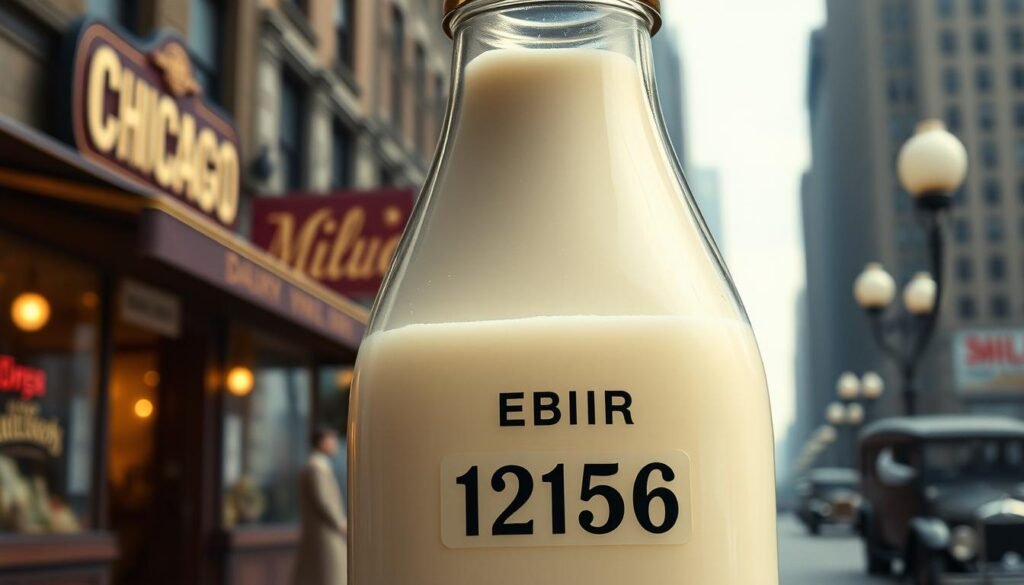Whole oranges are a nutritional powerhouse, giving you health benefits that go beyond orange juice.…
Read More →

Whole oranges are a nutritional powerhouse, giving you health benefits that go beyond orange juice.…
Read More →
As events continue to unfold following the devastating earthquake in Nepal over the weekend, there…
Read More →
For the past two springs, I’ve visited Antigua and am well aware of the mosquitoes…
Read More →
In the world of e-commerce, Temu, Shein, and AliExpress from China are big names. They…
Read More →
Both girls look absolutely ah-mazing as they celebrated the launch of Samsung’s new Galaxy S6…
Read More →Al Capone was a famous American gangster known for his crime and racketeering. But, he also had an unexpected role in improving public health and food safety. This section looks at how Capone’s actions led to the creation of milk expiration dates. This idea has become a key part of the dairy industry today.
During the Prohibition era, Al Capone controlled the Chicago dairy industry. He controlled milk distribution and sales. Capone introduced expiration dates on milk bottles to keep profits high.
Capone wanted to hide spoiled or contaminated milk. He thought expiration dates would keep customers unaware. But, this move had a big impact on public health.
“Capone’s introduction of expiration dates on milk bottles ultimately had a lasting impact, paving the way for improved food safety and consumer awareness.”
Capone’s move raised awareness about fresh, non-spoiled dairy products. It helped prevent food poisoning and other health issues. This was important back then, when refrigeration and quality control were not as good.

Capone’s effort to protect consumers shows even the worst can do good. His legacy in the dairy industry and consumer behavior still lasts today.
In the Prohibition era, the U.S. saw the rise of big crime groups, like Al Capone’s in Chicago. These groups took over many industries, focusing on the dairy business. Capone and his team used bribery and threats to control the milk in the city.
The Prohibition era’s lawlessness led to more crime, especially in the dairy business. Capone’s group and others used force and threats to get into the milk business. This made it hard for people to get safe milk.
The dairy business was easy prey for crime groups, causing fights for control. Capone’s group fought others, leading to violence and more problems. In the end, a few crime groups controlled the milk, setting prices and rules.
| Organized Crime and Milk Rackets in the Prohibition Era |
|---|
|

The Prohibition era’s lawlessness and the rise of big crime groups deeply affected the dairy industry. It led to widespread corruption, fights, and the creation of milk monopolies run by crime.
Al Capone’s crimes were harmful, but he also helped food safety. His group wanted to control the milk supply. They introduced expiration dates on milk bottles, a big step for public health.
Before Capone, milk didn’t show when it was fresh. This made people risk getting sick from bad milk. Capone’s team made a change. They put dates on bottles so people could choose safe milk.
This small change helped a lot. It let people know when milk was safe. Capone’s team helped make food safer, even if they didn’t mean to.
Capone’s bad actions are well-known, but his effect on milk safety is important. This shows that even in tough times, good things can happen. It helps society, even if it was not the original plan.
| The Impact of Capone’s Milk Expiration Dates | Before Capone’s Intervention | After Capone’s Intervention |
|---|---|---|
| Milk Freshness Indication | Unclear | Clearly Marked Expiration Dates |
| Consumer Awareness | Limited | Increased |
| Foodborne Illness Reduction | Low | Significant |
| Overall Food Safety Impact | Minimal | Substantial |
Before refrigerators were common, unrefrigerated milk quickly grew bacteria, especially in warm weather. This made it a big health risk. Drinking bad milk could cause serious illnesses like salmonella, listeria, and E. coli infections, known as food poisoning.
Unrefrigerated milk was perfect for bacteria to grow fast. This could make you very sick with stomach problems like nausea, vomiting, and diarrhea. In the worst cases, it could even cause dehydration, organ failure, or death.
Adding expiration dates helped people know when milk was no longer safe. This cut down the chance of getting food poisoning from bad dairy.
| Bacteria | Health Risks |
|---|---|
| Salmonella | Salmonellosis (food poisoning) |
| Listeria | Listeriosis (life-threatening infection) |
| E. coli | E. coli infection (severe diarrhea, kidney failure) |
“Consuming spoiled or contaminated dairy products can lead to serious illnesses and even life-threatening complications.”
The idea of milk expiration dates was a big change in food safety. It came from Al Capone’s group during the Prohibition era. By putting a clear date on milk bottles, people could tell when it was no longer good. This helped them buy safe and fresh dairy products.
Before Capone’s time, the dairy world didn’t have clear signs of milk freshness. People often wondered if the milk was safe to drink. Capone’s team wanted a simple way for buyers to know the food quality of their milk.
“Expiration dates were a game-changer in the dairy industry. Suddenly, consumers could trust that the milk they were buying was fresh and safe to drink.”
This new rule helped start modern dairy industry regulations and quality checks. It made milk expiration dates a common rule in the U.S.
Capone’s move to add milk expiration dates has made a big difference. It has helped the dairy industry and built trust with consumers. This idea still shapes how we check the freshness and quality of our dairy today.
The introduction of milk expiration dates changed the game for public health and the dairy industry. It helped people choose fresher, safer milk. This move cut down on foodborne illnesses linked to bad dairy products.
This change also made people trust the dairy industry more. It led to better food safety regulations. Now, milk’s expiration date is clear. This lets customers buy with confidence, avoiding risky products.
| Impact of Expiration Dates | Before Expiration Dates | After Expiration Dates |
|---|---|---|
| Public Health | Higher incidence of foodborne illnesses related to spoiled dairy | Reduced foodborne illness outbreaks, increased consumer trust |
| Dairy Industry | Lack of transparency, potential for contamination and spoilage | Improved food safety standards, enhanced consumer confidence |
| Regulatory Oversight | Limited regulations on dairy product freshness and quality | Stricter food safety regulations and quality control measures |
The expiration date system did wonders for public health and the dairy industry. It gave a clear sign of milk’s freshness. This empowered consumers, boosting trust in the industry and pushing for better food safety regulations.
“The introduction of expiration dates on milk was a game-changer for the dairy industry, as it helped restore consumer confidence and drive improvements in food safety.”
Al Capone’s use of milk expiration dates changed the game. Now, the dairy world has strict dairy industry regulations and quality standards. These rules help keep milk and dairy products safe and fresh.
Pasteurization is a big deal in the dairy world today. It heats milk to kill off bad bacteria. This is key for food safety.
Dairy folks also follow strict quality control rules. They make sure the milk is good from start to finish. This means the whole process, from making to selling, is top-notch.
Thanks to Capone’s early work, today’s dairy industry regulations keep dairy products safe and high-quality. This protects us and makes sure we always have milk.
“The dairy industry’s commitment to food safety and quality control is a testament to the lasting impact of Capone’s milk expiration date initiative.”
Al Capone’s life was full of crime and controversy. Yet, he played a role in improving public health. His actions led to the creation of milk expiration dates.
Capone got involved in the milk business in the 1920s. His motives were bad, but his actions helped. They led to the use of expiration dates on milk.
This change helped keep people safe from bad milk. It stopped the spread of harmful bacteria. Today, we take milk expiration dates for granted.
Capone’s story shows that even the worst people can have good effects. The milk expiration date is a big part of our lives. It shows how complex and surprising history can be.
